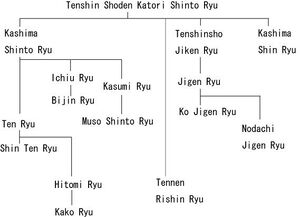Difference between revisions of "Jigen Ryu"
From SamuraiWiki
Jump to navigationJump to search (some cleanup) |
|||
| (4 intermediate revisions by one other user not shown) | |||
| Line 1: | Line 1: | ||
| − | |||
* ''Type: [[Kenjutsu]]'' | * ''Type: [[Kenjutsu]]'' | ||
| − | * ''Founder: [[Togo Shigekura | + | * ''Founder: [[Togo Shigekura|Tôgô Shigekura]] 東郷重位 ([[1563]] – [[1643]])'' |
* ''Era: late 1500s or early 1600s'' | * ''Era: late 1500s or early 1600s'' | ||
| + | * ''Japanese'': 示現流 ''(jigen ryuu)'' | ||
| − | Jigen | + | Jigen-ryû is famous as [[Satsuma province|Satsuma]]'s local ''[[kenjutsu]]'' school or style, and its philosophies have been much mythologized in association with the lionization of the "heroes" of the [[Satsuma Rebellion]] and of the [[Bakumatsu]] and [[Meiji period]]s otherwise. |
| − | One of the | + | |
| − | This | + | One of the most celebrated followers of this style is [[Saigo Takamori|Saigô Takamori]] ([[1827]]-[[1877]]) who led a revolt on the island of Kyushu against a [[military conscription|conscription]] decree issued by the [[Meiji Emperor]]. |
| + | |||
| + | This ''ryû-ha'' is famous for its unique concept "You must kill the enemy in the first ''tachi''." | ||
| + | [[Image:Shintoryu.jpg|right|thumb|Shinto Ryu geneology]] | ||
==References== | ==References== | ||
Latest revision as of 04:07, 24 September 2014
- Type: Kenjutsu
- Founder: Tôgô Shigekura 東郷重位 (1563 – 1643)
- Era: late 1500s or early 1600s
- Japanese: 示現流 (jigen ryuu)
Jigen-ryû is famous as Satsuma's local kenjutsu school or style, and its philosophies have been much mythologized in association with the lionization of the "heroes" of the Satsuma Rebellion and of the Bakumatsu and Meiji periods otherwise.
One of the most celebrated followers of this style is Saigô Takamori (1827-1877) who led a revolt on the island of Kyushu against a conscription decree issued by the Meiji Emperor.
This ryû-ha is famous for its unique concept "You must kill the enemy in the first tachi."
References
- Nihon Densho Bugei Ryuha Dokuhon(日本伝承武芸流派読本) Shinjinbutsu Orai sha 1994
